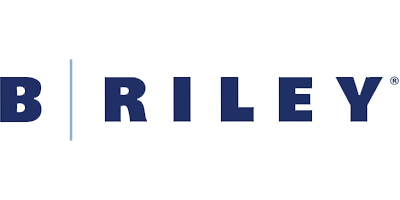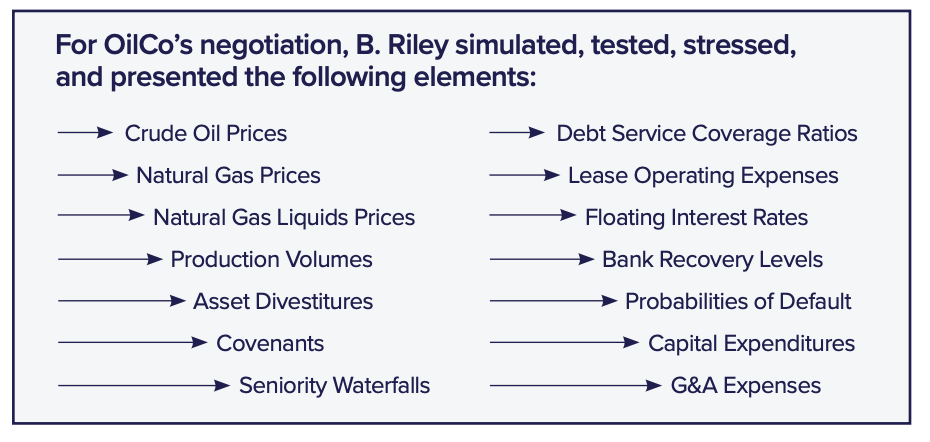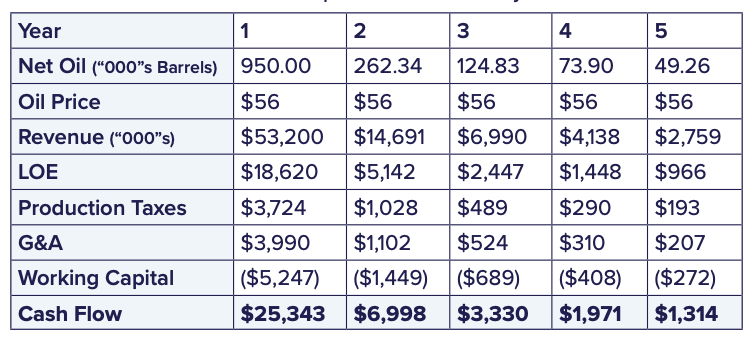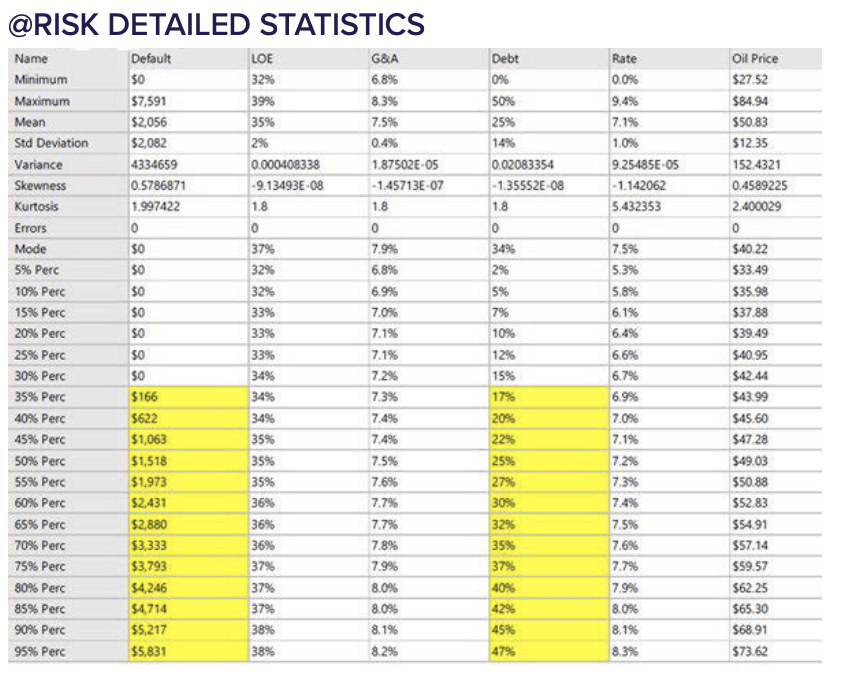
Background
B. Riley Advisory Services helps oil and gas companies with transaction, commercial analytics, litigation, and valuation opinion services. Their expertise is respected in the oil and gas industry, where the unique volatility in their prices can be difficult to handle in these types of services. B. Riley uses probabilistic methods rather than deterministic methods to provide their clients accurate results.
Negotiating Under Uncertainty
The B. Riley team aided one oil and gas client [anonymously named “OilCo” for this case study] that faced “Chapter 22”—a term for a company that files bankruptcy a second time after 2-3 years. OilCo hoped to avoid Chapter 22 by selling their company to a potential buyer. However, restructuring work can prove difficult for a company with top-line revenue driven by volatile oil and gas prices. B. Riley knew that any assumptions that drive the cash flow models used to restructure an oil company in distress should be simulated. Palisade Corporation software provides the tools to make this happen.
Using Palisade Products
“We relied on @RISK to capture both the variability and volatility in the possible range of outcomes for OilCo,” says said Dan Daitchman, Director at B. Riley Advisory Services. “A single scenario simply would not have accurately captured the economics of OilCo and the industry.”
@RISK’s data driven probabilistic simulations can easily handle post-bankruptcy structures that endure severe price movements. The software’s capabilities can then help the companies, lawyers, and bankers avoid overlevering the company a second time.

Dan Daitchman
Director at B. Riley Advisory Services
Finding the Right Price
The analysts incorporated these variables into their calculations for determining OilCo’s sale price. They estimated the downward price adjustment resulting from the net operations proceeds to be $21.3 million. Other net adjustments reduced the purchase price by $11.75 million, resulting in a purchase price of $205.7 million.
Using the reorganization plan draft, the team estimated that the net proceeds from the settlement of the remaining assets and liabilities through bankruptcy would be $13.5 million, and the net proceeds from the sale of OilCo and the settlement of the remaining assets and liabilities in bankruptcy would be $165.2 million. This recovery could have been reduced to $145.9 million if the title defects were asserted at the maximum amount and the bankruptcy was prolonged for a longer period.
The team next prepared a “Plan B” scenario which compared the bank recoveries under a “hold” (e.g., credit bid) scenario versus the sale scenario discussed above. Plan B assumed the sale of the nonstrategic assets at year-end for $35 million with the proceeds used to pay down the bank debt.
The B. Riley team then performed a review of general and administrative expenses and reduced amounts for a leaner company through outsourcing certain functions. Based upon their review and models, the team estimated that OilCo would have enough cash flow to operate through the end of the next fiscal year
Next, the B. Riley team estimated the net proceeds from a sale of the properties in the third of fourth quarter of the next fiscal year. They discounted future oil reserve cash flows by 20% and risked Proved Developed Producing (PDP), Proved Developed non-Producing (PDNP) and Proved Undeveloped (PUD) values by 15%, 50% and 100%, respectively. This is a conservative valuation by historical standards and there were few trans-actions completed in this challenging time frame. Based on these analyses, the team estimated the bank recovery under a Plan B scenario to be approximately $133.2 million.
Overall, the B. Riley team estimated the bank recovery resulting from the reorganization plan draft to be about $165.2 million, with a downside case of $145.9 million. In the Plan B scenario, the bank recovery would be $143.2 million. Since the recovery estimates were so close, the team advised that each bank decide which approach to take based on their specific appetites for risk.
Ultimately, OilCo selected the first option, avoiding the Plan B scenario. Thanks to the B. Riley team’s consulting, the company was able to successfully negotiate a deal with a potential buyer and has avoided “Chapter 22” to this day.


Benefits of @RISK
The B. Riley team considers @RISK an indispensable tool for their work in the oil and gas industry, where multiple variables can interact and shift in unpredictable ways. “There were a lot of moving parts in this transaction, and each stakeholder had a unique viewpoint.” said Daitchman. “@RISK helped us navigate all of the various outcomes and provide clear solutions that all stakeholders could use to negotiate. @RISK was invaluable in this case; we couldn’t have reached a successful outcome without it.”

